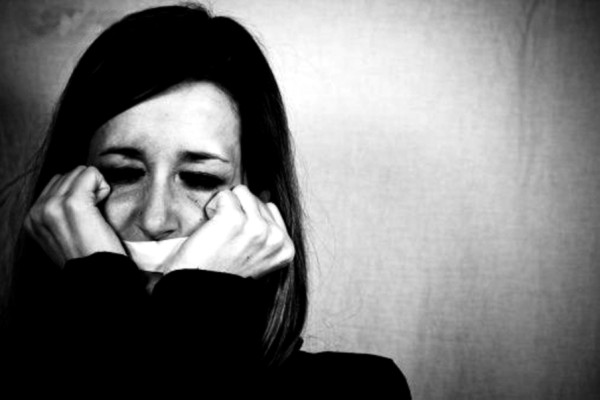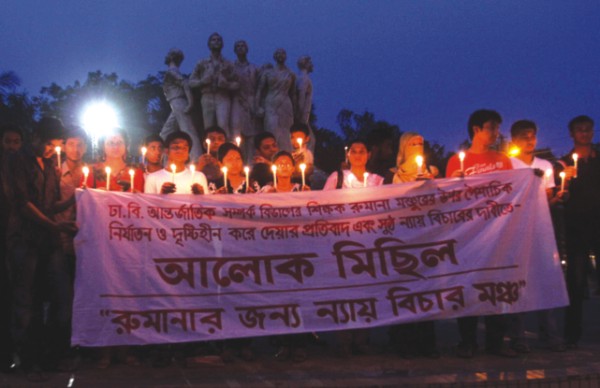
Inside
|
Back to Black
The case of Rumana Monzur and others will simply fade in and out of newspaper headlines and civil society interest, forecasts SHAHANA SIDDIQUI.
(Friday Afternoon 3-ish, before the rally for justice for Rumana Monzur)
The pictures are everywhere. The battered nose. The eyes gouged out behind the black glasses. Everyone is talking about it. Everyone is suddenly aware, upset, horrified, shocked.
This case, unlike the hundreds every year, is a little different, at least to our Dhaka civil society. This case hit home. Sumon can be any of our educated, self-congratulating civil society brothers, fathers, husbands. BUET educated, good family. The question on everyone's lips and minds -- ekta shikkhitoh chhele erokomtah korte parlo? Suddenly the beast is not in some remote area of Bangladesh. Suddenly he is not the rickshawallah or our house help's good for nothing, bangla-mod drinking abusive husband who lives off her salary.
No, he is one of us. English reading, car riding, parents' dream come true engineer son that you all wanted your daughters to find and settle down with. It's shocking to you, to us, because he destroys all of our fragile constructions of class. Just when we thought we are above it all, this Sumon character appears and makes us a little uncomfortable. Degrees from renowned institutions do not necessarily educate, and bhalo paribar are not so bhalo after all.
It shook us somewhere at the core. My fellow Drishtipat writers sprang quickly. The men wrote about the poison that breed violence, the women wrote about the silence of it all that allows for men to violate us. It was quite heartwarming to see especially the DWC men react so vigilantly, so passionately against the violence of this case. But I also understand why they reacted so vehemently: as the blogger Jyoti Rahman wrote -- the animal lives inside us all.

Photo: MAHMUDUL HOQUE MONI
For me, a survivor myself, this was just too personal. Came in front of the computer at least thrice -- three different drafts at three different times. Could not seem to finish anything. First it was just anger. Raw anger that just wanted to hunt Sumon down like the animal he is and take a bat to his head. The animal lives inside of me too. Just tamed it over the years.
Then a day or two later, I attempted again but the article still stayed unfinished, words just wouldn't fill up the blank pages. This time it wasn't rage stopping the flow -- it was the tears. I don't know Rumana. I never met her but I grieved for her the way I did for a close friend in an abusive relationship, or the way I grieved for myself at the realisation of innocence lost. This grief is beyond anything I can explain with words. It is a deep pain that comes from the bitter realisation that goddammit I am not alone in this. It comes from a head against the wall frustration that this keeps happening over and over again and nothing is stopping it.
It is a gut wrenching fear that my son can one day be a perpetrator and my daughter a victim.
And speaking of children, I wonder how their little girl, Anusheh, is doing. How will this affect her? How unbelievably horrible it must be for a little girl to witness this nightmare. And to think, Rumana thought she needed to stay on in this relationship for Anusheh's sake. How we delude ourselves into thinking our men will love us, hold us, care for us despite the abuse, the harm, the insults. Relationships are filled with ups and downs, egulo ektu hoy, we are taught. Compromise. Bear it. Once you have a child, we are made to think that it is it, no matter what, make the relationship work. He will change, he will be a better father, husband, provider, protector.
But the truth is, once the arm is raised, the insults hurled, once you have been kicked, once the pushing and the shoving happens, the protective bubble is broken. They don't change. The more you compromise, the more they grow stronger. But no one will ever teach you that.
No one.
That's why I am taken aback, almost amused by comments of why didn't Rumana leave the abusive relationship. Especially, why did a highly educated, financially independent woman stay on in an abusive marriage?
As if it is so easy to just get up and leave a decade-long relationship. As if we have made it socially acceptable for Rumanas to just get up and leave. As if being financially independent has anything to do with being free from social norms and prejudice.

Photo: PICCERELLA/GETTY IMAGES
Honestly, tell me, how many of you told your sisters, cousins, daughters, friends to stay on a little longer in a bad marriage, abusive or not? How many of you advised to compromise at least for the sake of the child(ren)?
Look around you -- we have made a society that does not permit women, no matter how financially independent, to lead a life of her own choice and accord.
The few of us who do, we become social pariahs, subject of high-tea gossip. We are the ones you will keep your men at an arms length, but run to for legal advice the minute things aren't going too well in your Facebook picture perfect lives. How fantastic we are at doling out free advice and giving an illusion that we are each other's safety nets. The naked truth is Rumana didn't leave Sumon because we, the society in all our glory and civility, did not create a space for her to walk out.
It has been over three weeks of high-strung drama -- the abuse, the horror, the hiding, the arrest, the surgeries, the protests and rallies. I am getting ready to go to one in a bit. While the optimist/activist in me is determined to stand up and shout and protest, believing that every little action against abuse and violence is needed, the realist/survivor inside of me just knows nothing will change quickly, if at all. Things may improve at the margins, but not dramatically, institutionally, or structurally. Rumana, myself, and the millions and millions of more women and children will continue to be statistics of different forms of violence and abuse, reported or unreported.
(Friday night, around 11ish after coming home from the protest a couple of hours ago)
Hour and a half on the road, shoppers' traffic, picking up a friend, traffic detouring by police, and short rickshaw ride later, we arrived at Shahid Minar. I brought my son along -- I may not be able to change the entire patriarchal society, but at least I can start with my own offspring, right?
Though we were late, I could figure out in less than five minutes of being there that it has been more or less the same as the current speaker -- a self righteous, atel lot, saying something only he can understand in an over dramatised voice and elaborate gestures. It gets better -- a poetry recitation and that too Rabindranath's. Because how can we be civil Bengali society without Tagore? (My son had his hands over his ears -- that reaction summed it up quite well!) What was the point of the poetry is still beyond me!
Just when I thought it could not get any more irrelevant, up comes a vivacious speaker with hands everywhere, whole body shaking, narrating the gruesome story of Sumon's attacks on Rumana as if she was there while it was happening! (My son's vocabulary is not strong enough to understand the narrative -- all he could fathom was that the woman was shouting!) If you could look beyond the unnecessary dramatic booming voice, the speaker was making sense about women thinking they can avoid abuse by playing by the book. Rumana played by the books but she was still violated. “Bhalo thekeo jodi nirajaton'r shikar hote hoy, tahole amra bhalo thakbo na, amra noshto hoye jabo” … and right around that, she lost me! And the loudness kept rising, and the politician like ranting kept going on. Right after she ended, my son asked, Maa, amaderke boka dilo?
A media personality at one point made it into her little theatre space for a monologue. A baul sang and Rumana's university colleagues made some more comments on what a wonderful person she is and how she should come back to teach (thank you all for the character certification!). In the one hour we were there, no one mentioned what was the status of the case.

Photo: SHAWKAT JAMIL
Who was pressing charges against Sumon? Who were helping Sumon hide for almost 10 days? Has anyone even checked if Sumon is mentally stable?
And those are just my questions on Sumon. What about Rumana and her family? Why did her family not do anything about the abusive husband earlier? Even after this horrific abuse took place, why did they not want media to cover it? Is the threat of some political stronghold so much more than one's daughter's life?
Maybe we missed the information session -- perhaps something was said about the status of the case earlier, but surely an hour into the programme, someone could have updated the audience again?
But all of that seemed inconsequential. What was important was to make broad, generalised comments of empowerment, rights, stand up against violence and women break free from your shackles. What was important was to have yet another soap box to publicly show how concerned we are, how horrified we are, how aware we are. What was important was to keep the appearance of being a civil society member alive. We came, we spoke, we displayed how progressive we are.
So yes, I go back to what I wrote at 4:30 pm before going to the rally: Rumana, myself, and the millions and millions of more women and children will continue to be statistics of different forms of violence and abuse, reported or unreported (and the object for civil society to have a cause, a drama, a show.)
Shahana Siddiqui, is a frustrated and exasperated citizen and a member of Drishtipat Writers' Collective. She can be reached at: shahana@drishtipat.org